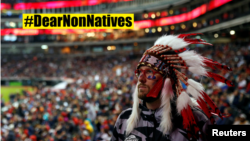Native American youth are increasingly using social media to counter harmful stereotypes about Indians that persist in the media and popular American culture.
"I think here in the United States, we are pretty much an afterthought," said journalist Tristan Ahtone, a member of the Kiowa Tribe of Oklahoma and a 2018 Nieman Fellow working to improve mainstream media coverage of indigenous communities.
"These folks on Twitter and other social media outlets who are trying to have their voices heard are, if nothing else, looking to supplement the American education system, which has done absolutely nothing to inform citizens about indigenous people," he said.
Some tweets look to dispel the myth that Indians are relics of the past.
They'd like non-Natives to stop lumping them into a single, generic culture...
...and to stop romanticizing them.
They'd like textbooks to stop sanitizing U.S. history.
They'd like non-Natives to stop using "Indian" imagery to name sports teams and mascots.
"It’s a common problem in the United States," said Ahtone. "Our images have been appropriated for selling everything from tobacco to tires to insurance."
Some Native Americans get depressed around American holidays, especially Columbus Day, which honors the Italian explorer whose arrival in 1492 opened the door to the slaughter and oppression of indigenous populations...
...and Thanksgiving, which commemorates a 17th Century harvest feast British settlers shared with Wampanoag in Plymouth, Massachusetts. To many Native American minds, the holiday promotes colonization as something peaceful and advantageous to everyone.
Native Americans would like non-Natives to stop appropriating their clothing and ceremonial regalia...
...as well as their spirituality, especially for commercial profit.
They would like non-Natives to stop "educating" them about their own history or telling Natives how they should feel.
And they want a voice in mainstream media.
"Mainstream media isn't designed to have voices outside of affluent, white America," said Ahtone, a sentiment VOA has heard from several Native journalists.
"I talk a lot about diversity in media and newsrooms. But as far as I am concerned, you can throw all the diversity you want at a newsroom, but if that newsroom doesn’t actually think the stories those people can produce are important, then it’s a complete waste of everybody’s time."
Ahtone cautions that these posts in social media represent only a small cadre of individuals in Indian Country, which comprises 573 tribes with distinct cultures and experiences.
"And a lot of times in social media, its just political posturing, just rhetoric," he said. "If you want to get to real, in-depth stuff, you’re going to have to go past the facade of what social media offers."




